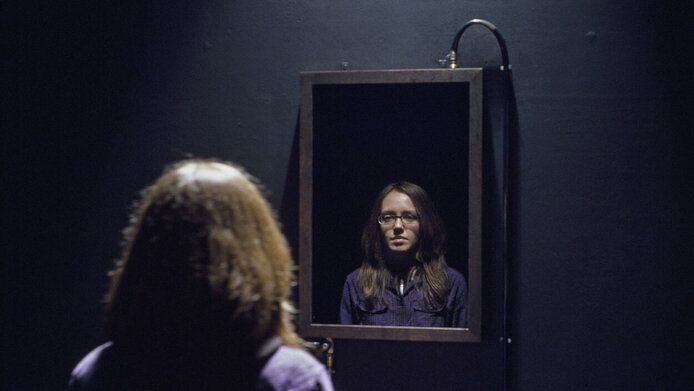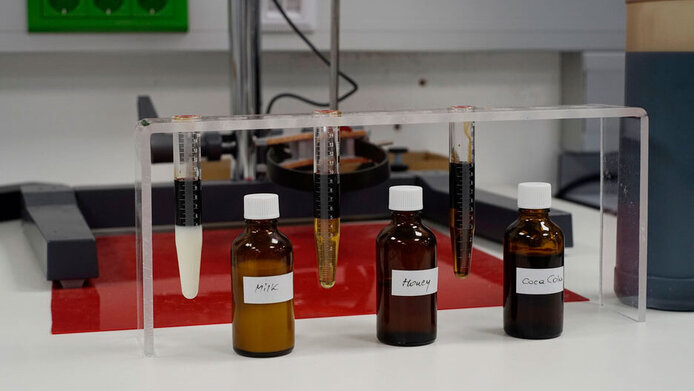Reflections on an oil culture

Oil was and still is one of the most important cornerstones of the global economy. This resource is at the basis of the prosperity that many countries accumulated in the course of the 20th century. On the other hand, it also triggers armed conflicts and contributes to environmental pollution and the rapid warming of the planet. For these reasons, there is growing pressure to restrict its use. Oil-based products are omnipresent in people's daily lives: be it objects made from plastics, fuel in cars or heat from heating systems. At the same time, most people can hardly relate to the raw material – the crude oil that is pumped out of oil wells or washed out of sandstone deposits by means of fracking.
In his project “Reflecting Oil”, the media artist Ernst Logar has addressed this ambivalence, which characterises our handling of the resource of mineral oil. Logar, a research associate at the University of Applied Arts Vienna, uses the means of art-based research – a scientific-theoretical approach in which individual sensory experience in experimental settings serves as a means of generating knowledge – to explore the multi-layered relationship human beings have with this raw material, which is invisible in everyday life.
“On the one hand, crude oil is something abstract for most people, and in the project we want to make this substance accessible and tangible – its visual appearance, smell, feel, and also its toxicity,” Logar explains. “On the other hand, the intention is to examine our oil-based culture – we also speak of petroculture here – from different perspectives in an interdisciplinary way.” In the project Logar and his team are also cooperating with technical scientists from the Department of Petroleum Engineering at the University of Leoben.
More information
Publication
Oil as part of human identity
One of the initial sources of the project is the artwork “Reflecting Oil” by Logar, which also gave the project its name. In this piece, the crude oil, which was packed behind Plexiglas, acted as a mirror. Together with its reflection, the work demonstrates to the viewers to what a large extent oil is part of the human identity. Another work that is currently being created in the context of the project picks up on this idea. It involves a tool used in oil research in Leoben – a microfluidic chip. This chip is used to investigate the flow behaviour of crude oil in tiny geological structures – for instance micro-scale sandstone channels. At this point, the artist intervenes and changes the pore structure of the material sample by inserting images of petroculture residues into this sandstone structure on the chip. The residues include things such as old plastic bottle caps, part of a plastic spoon or other things that one may find as litter on a beach, for example.
Logar also contrasts oil with other liquids, such as milk or honey. By passing these through the chip instead of the oil – or instead of the emulsion that is supposed to wash the oil out of the sand during fracking – the artist places crude oil in a new, surprising contrasting relationship with other cultural substances from the human world.
This contrast also resonates with Logar's way of looking at things. He considers the human use of oil to produce a clash of two spheres which are governed by completely different time scales. One is the geological sphere of oil that involves tens of tons of biomass having to endure over hundreds of millions of years under extreme pressures and temperatures deep in the Earth's crust to generate a litre of oil. “Seen from this perspective, oil appears incredibly valuable, but this value is not reflected in the economy,” says Logar.
The value of the raw material is ignored just as much as the impact of its use on the natural world. “Human beings seize the substance from the geological sphere in order to feed it into the human ecological sphere, which is characterised, for instance, by the emergence and passing of life in time with the seasons – hence it ends up on a completely different time scale,” notes Logar. It is not surprising, therefore, that oil, which originated outside of a human time horizon, is perceived as toxic and unpleasant, but at the same time constitutes such a powerful tool. -–Honey, with its origins in the ecological sphere, is in stark contrast to that.
Social transformation
This ambivalence has made oil an essential part of human identity. Since this energy source provided a new basis for human mobility, it also strongly affects social identity, as Logar emphasises. “If one pursues this train of thought, it seems imperative for social changes to occur in order to reduce our dependence on oil,” Logar adds. A response to climate change will therefore also result in a social transformation.
The project “Reflecting Oil” involves joint workshops and experiments as well as the creation of a network of researchers and artists. The pandemic permitting, there will be a colloquium in the autumn, in which the topic will be further explored in various working groups. At the end of the project, an exhibition will present the artwork created, and a publication will give a systematic overview of the cultural approaches developed. In addition, the contents will also be used in the future to enrich the technology-oriented studies at the University of Leoben with a cultural dimension.
Personal details
Ernst Logar studied experimental visual design at the University of Arts and Industrial Design in Linz and cross-media art at the University of Applied Arts in Vienna, where he now holds a position as a research associate and lecturer at the Department of Site-Specific Art. In a series of projects, exhibitions and publications, the artist has already dealt with the significance of oil for humanity. The project “Reflecting Oil: Arts-based research on oil transitionings” is being supported with EUR 390,000 from the Austrian Science Fund FWF under its PEEK funding programme. The project will run until 2023.
Exhibitions and projects
2021 Statement #11 | Ernst Logar - Crude Oil Experiments, Kunstraum Lakeside, Klagenfurt
2017 Reflecting Oil, Vienna Art Week 2017, Studio-Ernst Logar, Vienna
2016 Tar Sands – Approaching an Anthropocentric Site, PAVED Arts, Saskatoon, Canada
2010 Sustainable Transformation, GLOBArt Academy, Schloss Pernegg NÖ
2008 Invisible Oil - Peacock Visual Arts, Aberdeen (UK)







